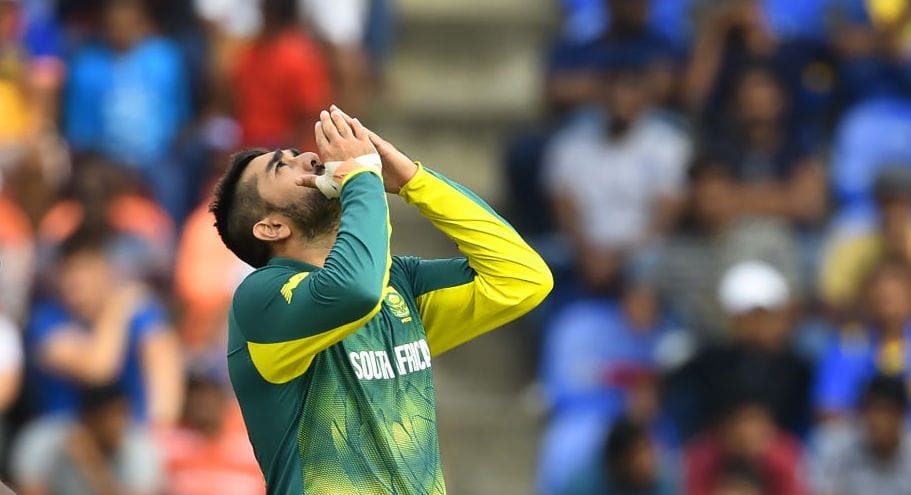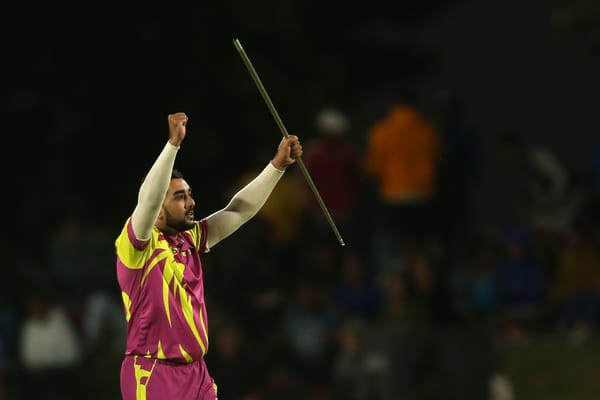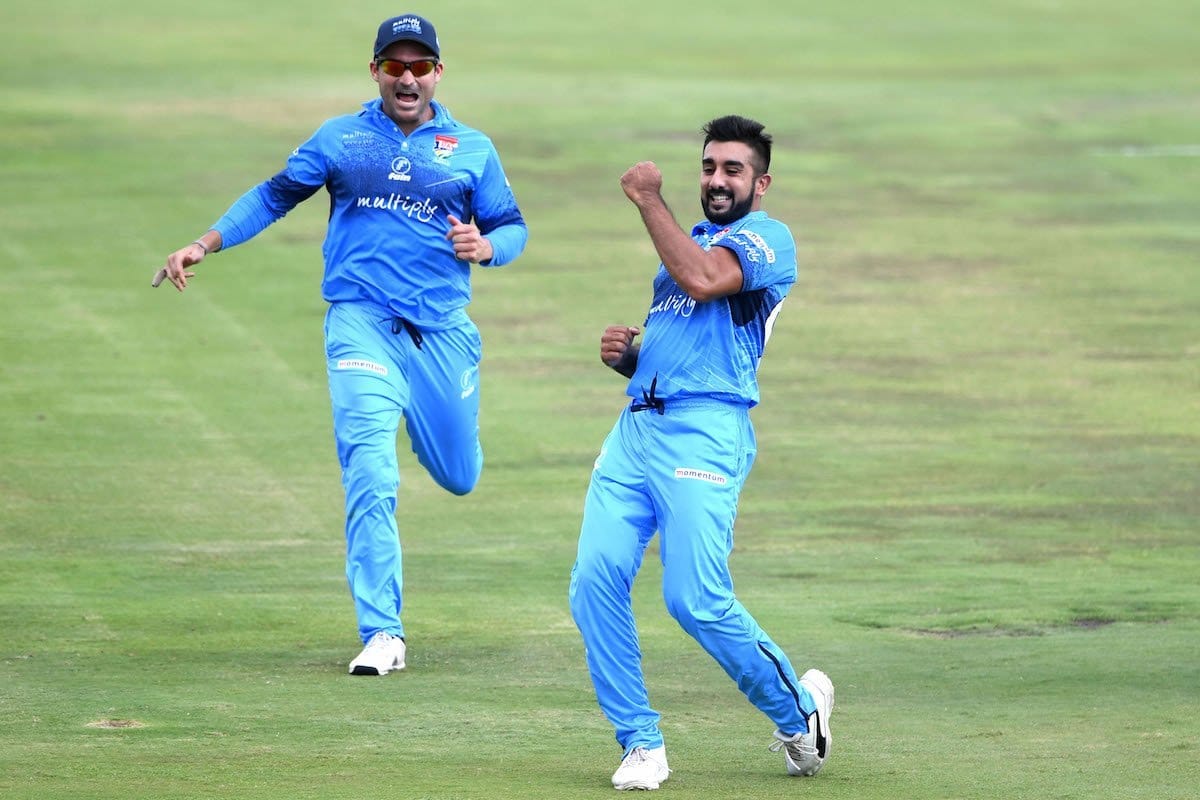Tabraiz Shamsi is enjoying the moment
Tabraiz Shamsi is taking nothing for granted, he never has...
This article is brought to you by FRDM: Taste of Africa
If you are not a subscriber of Stumped!, join more than a thousand other professional athletes & ex-pros, coaches, commentators & analysts and casual sports fans that receive the newsletter in their inbox each week — it’s free:
Shamsi is happy to be here.
He is alone, getting ready for bowling practice. He sets up his camera, a Canon EOS 250D, at the bowler's end. This helps to see whether his alignment is on point and if his action changed or if something is not where it should be. This is the beauty of having a top-of-the-range camera, it picks up even the most minute details. Little details are important.
After a serious bowling spell, he sets it up at the batter/wicketkeeper's end. This angle helps him to analyze his variations. The biggest weapon for any spinner is if they can keep the variations as subtle as possible. It wouldn't help much if his action was communicating big giveaways to anyone watching.
"I like to place the camera at the front so that I can get a perspective of how the batsman sees my hand and how the batsman sees my action," he smiles.
He likes it this way.
Buying a top-of-the-range camera for practice is something 15-year-old Shamsi might have fantasized about as he played cricket with his buddies, using a neighbour's garage door as wickets. But it is not something that he would have really taken seriously. Yes, his mind was bent on succeeding at the sport, he didn't pay attention to any other sport at school, but, the limitations faced by people from certain backgrounds have a way of forcing a teenager to develop a backup plan.
"For me, it wasn't a normal road as it is for most of the other guys: you're identified early and you play all the age-group levels and things like that," says Shamsi. "My earliest memory of trying to go for trials was at 15. I was trying to get into the Gauteng Under-15 side."
So, he had a backup plan, magic. Young Tabraiz's backup, just in case the cricket thing did not work out, was becoming a professional magician. He was convinced he could be a decent magician and possibly make a living out of it.
"Until the age of 16, I really wanted to be a magician. I enjoyed the way it puts smiles on people's faces, the way it brings amazement on their faces when a magician does a trick that they can't believe."
But those dreams fell away when he got selected for the Gauteng Under-17 and then the Under-19 teams. It was only at this point that the possibility of a successful career in cricket began to take root. He could carve a career out of this, but he also knew that it wasn't going to be easy.
In an abstract way, he understood the Matthew Effect. The Matthew Effect is also referred to as accumulated advantage, where those who have more are given the advantage to gain more, and those that do not have status typically struggle to achieve more. It gets its name from the biblical verse in the Gospel of Matthew. In the case of sports, prodigies are given more opportunities to become better by being given greater exposure than non-prodigies. No coach was going to drop a player who was identified early as a future star over a player like Shamsi who worked his way up.
The Matthew Effect: 'For unto every one that have shall be given, and he shall have abundance; but him that have not shall be taken, even that which he have.' - Matthew 25:29.
So, he worked very hard and tried to make the most of every opportunity he got, big or small. He played each game as if he had something to prove because, in a way, he did have a point to make.
From as early as Under-15, he was required to prove himself over and over and over again. Despite being named the bowler of the tournament and taking the most wickets at his Under-15 trials, Shamsi was deemed to be only good enough for the B-side. At the semi-pro level, he only made the Gauteng squad because the guy earmarked for that position got called up to the Proteas Under-19 squad.
"I knew that that was my one chance, and I had to make it work," says Shamsi.
And he did make it work. He played well and managed to lay claim to that spot. But that spot did not lead to growth at Gauteng, so he moved to the Dolphins in KZN where he was drafted into the KZN Inland squad. He hoped the move would improve his prospects. But four matches in four years for the Dolphins is not a good sign for a career with an upward trajectory.
"The reality is that at some point you have to make something of your life. You have to take care of your commitments at home, commitments with family. You have to provide for them. You can only play cricket for fun for so many years."
His cricket was not going anywhere at that stage, he was stuck in the B side and it felt as if he had reached his ceiling. So, Shamsi found himself questioning whether he had made the right choice. He wasn't regretting not having pursued magic as a career. But, he had put the brakes on his BCom Accounting degree studies at the University of Johannesburg to complete his move to Durban.
"So, I made up my mind and said that if I don't see any progress, I will go back to university and finish my degree."
His lack of progress was not because he couldn't handle the hard work needed to succeed from that point onwards. From an early age, Shamsi had learned that he needed to work very hard to achieve success. Twice as hard as most people, in fact. But at this point, it seemed that no matter how hard he worked, nothing was helping.
Prasanna Lara, who got used to Shamsi coming to him late at night, around 12 am, for pointers and information knows just how much of a hard worker Shamsi is.
"Shamsi gives a lot of importance to very small things. No detail is too small for him," says match analyst Prasanna Lara. "He is always looking for ways to improve, taking notes and looking for more information."
And it’s not just before matches that he finds the need to work on his bowling, he does so after matches too. "After a match, I look at footage of my bowling," says Shamsi. "I want to see what I got right and what I did wrong, whether I went for runs because I bowled badly or if the batter just played well. If the batter played well, I try to understand how I can bowl better to a person like them."
Prasanna, who has worked with many players, says he has seen fewer players who are as hard on themselves as Shamsi. He has a compulsive drive to be better. And this is not something, a trait, that he suddenly developed later in life, he has always been like this.
But, no matter how hard you work, sometimes you need a bit of luck to go your way, you need some people to be at the right place at the right time for them to help you. For Shamsi, Grant Morgan was that person. As he was in his self-imposed make-it-or-break-it year, Grant Morgan changed everything for him. feeling that Shamsi's talents were not being fully utilized, Morgan got in touch with Rob Walter at Titans and made a plea for them to take Shamsi on board.
Morgan told Rob Walter that he had "a kid who was taking buckets of wickets, winning him matches, winning him trophies. He could keep him, but that would be a selfish decision that would not benefit the kid." He deserved more than semi-pro accolades. What he deserved, more than anything, was to be given a shot at the franchise level.
Morgan was Shamsi's guardian angel of sorts. A few years earlier, he had also been the same coach who had given him his break at Gauteng.
"I haven't seen many committed, dedicated and hard-working players like Tabraiz Shamsi," says Morgan. "He had that inner belief that he could do it and could succeed. He was also committed to the team doing well, and that is very important."
Stumped! is a reader-supported newsletter. Those who opt to leave tips (buy coffees) or become patrons are taking an active role in the work that I do by providing vital assistance to bolster my independent coverage of cricket. Feel free to forward this post to family and friends interested in cricket and/or cricketers.
The move to Titans was a turning point in his career. Even though Shamsi was not the first-choice spinner, Rob Walter did give him a good run. He played more matches. That move also changed him as a bowler. At KZN Inland, Shamsi was largely seen as a red ball bowler, but at Titans, he was immediately converted into a white ball bowler.
"At Dolphins Keshav was the white ball bowler and I was the red ball bowler. All my career, before Titans, I was told that I can't bowl with the white ball. But after my move to Titans, in my first season I did not play a single red ball game," Shamsi laughs at the irony of how things have turned out, it appears that at the national level Keshav and Shamsi have effectively swapped places.
There is a strong chance that if Grant Morgan had not moved to KZN Inland when he did, Shamsi might now be an accountant. There is also a strong chance that if it wasn't for Marlon Samuels, Shamsi might have never become who he is today.
"I got my big break because I wasn't selected for a match by the Titans," he says. "There was a South African Invitational team that was selected to play against the West Indies. The West Indies were touring South Africa, and we were selected to play them in a 3-Day game, to provide them with some match practice."
The invitational team was made up of a number of players who had failed to make the squad for their franchises that week. They were the dispensable players, they were not even SA A.
"When Marlon Samuels was on 10, I felt I had him out lbw, but the umpire didn't give him out. He ended up making a double-hundred," he muses. "And it's funny how things work, if he had been given out on 10 he would not have faced me that much and he wouldn't have seen what I can do."
Things definitely look different when you are facing the bowler than compared to watching them from the pavilion. And sure enough, it was after he had faced a lot of balls from Shamsi that Samuels decided to have a chat with him.
"He hit one ball to long-on," recalls Shamsi, "and as he finished his single he came up to me at the top of my mark and he says, 'Hey, would like to play for my CPL team?'"
And just like that, Tabraiz Shamsi had a foot into the Caribbean Premier League. In one match he went from being a guy who was not the first choice spinner for his club to playing in an international T20 league.
"My road to get me here has been a little different to most guys who reach this point," he laughs.
Lots of ups and downs, but Shamsi being Shamsi, sees the value of what he went through. He feels that the experiences, and the struggle, helped him develop confidence in himself and his abilities. He also feels that it has helped him become less fragile and more resilient, both as a player and as an individual. After all, it's not everyone gets early opportunities and makes the most of them.
"I was talking to some players in the last series we played as the Proteas, and I was saying to them, 'Those years where you wished you were playing franchise cricket, when you wished you were playing for South Africa, and you were just in the B-side grovelling, those are the years that make you who you are.'"
And he is glad that he went through all of it. It has brought him to the present, a place where he is happy to be.
He is happy with who he is and where he is now: MRF top T20 bowler, first-choice spinner for the Proteas, marquee pick for T20 clubs. And he is determined to make the most of it, to enjoy every moment.
Now, he checks what his camera captured, there will be notes to be taken, and no session is perfect. There is always something, and he tries to pay attention to everything. He doesn't want to miss anything.
"All this, it's gonna stop, eventually. No matter how good you are, no matter what you have done, at some stage, everybody has to stop playing. So I want to leave with some memories and also enjoy what I am doing while I am doing it because I know it's not going to last forever."
?si=BYKya3HvSpmkxRx-n5EuIA
Thank you for reading. I am entirely freelance and some very nice people help me to continue producing more content by donating a little here and there. Some do so by supporting my work on Patreon.
Others prefer to leave tips:
Others also support sharing posts that they enjoy. You can do all three.








